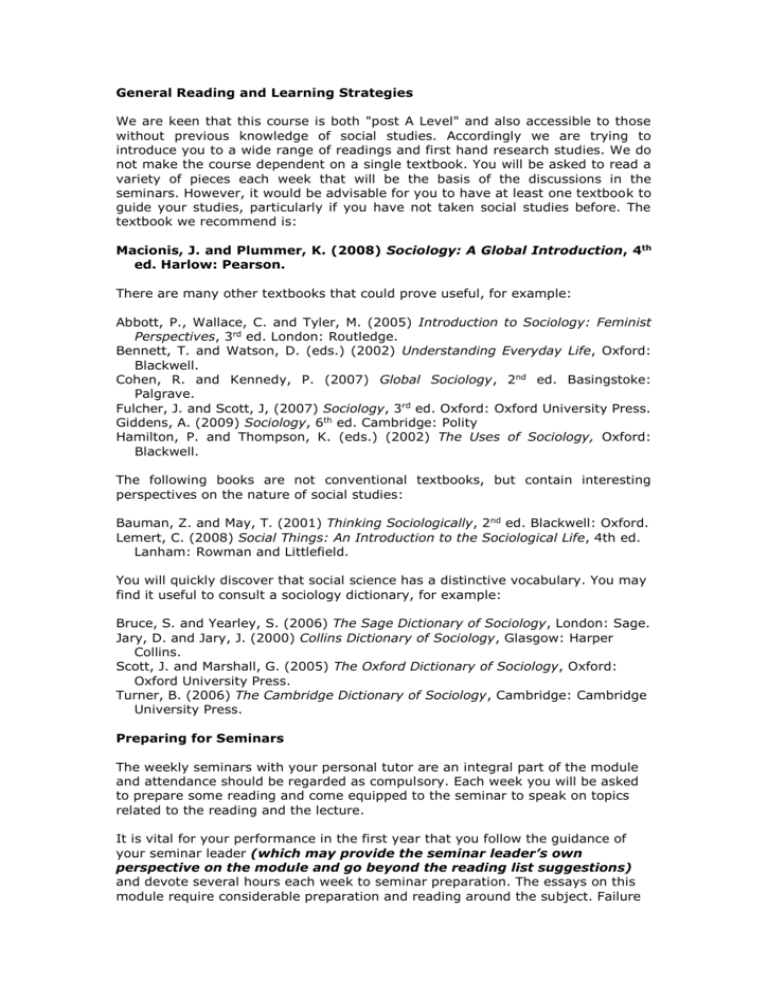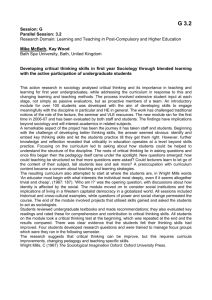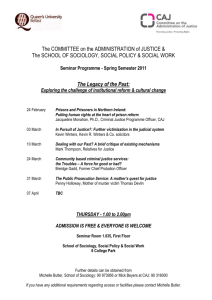module reading list
advertisement

General Reading and Learning Strategies We are keen that this course is both "post A Level" and also accessible to those without previous knowledge of social studies. Accordingly we are trying to introduce you to a wide range of readings and first hand research studies. We do not make the course dependent on a single textbook. You will be asked to read a variety of pieces each week that will be the basis of the discussions in the seminars. However, it would be advisable for you to have at least one textbook to guide your studies, particularly if you have not taken social studies before. The textbook we recommend is: Macionis, J. and Plummer, K. (2008) Sociology: A Global Introduction, 4th ed. Harlow: Pearson. There are many other textbooks that could prove useful, for example: Abbott, P., Wallace, C. and Tyler, M. (2005) Introduction to Sociology: Feminist Perspectives, 3rd ed. London: Routledge. Bennett, T. and Watson, D. (eds.) (2002) Understanding Everyday Life, Oxford: Blackwell. Cohen, R. and Kennedy, P. (2007) Global Sociology, 2nd ed. Basingstoke: Palgrave. Fulcher, J. and Scott, J, (2007) Sociology, 3rd ed. Oxford: Oxford University Press. Giddens, A. (2009) Sociology, 6th ed. Cambridge: Polity Hamilton, P. and Thompson, K. (eds.) (2002) The Uses of Sociology, Oxford: Blackwell. The following books are not conventional textbooks, but contain interesting perspectives on the nature of social studies: Bauman, Z. and May, T. (2001) Thinking Sociologically, 2nd ed. Blackwell: Oxford. Lemert, C. (2008) Social Things: An Introduction to the Sociological Life, 4th ed. Lanham: Rowman and Littlefield. You will quickly discover that social science has a distinctive vocabulary. You may find it useful to consult a sociology dictionary, for example: Bruce, S. and Yearley, S. (2006) The Sage Dictionary of Sociology, London: Sage. Jary, D. and Jary, J. (2000) Collins Dictionary of Sociology, Glasgow: Harper Collins. Scott, J. and Marshall, G. (2005) The Oxford Dictionary of Sociology, Oxford: Oxford University Press. Turner, B. (2006) The Cambridge Dictionary of Sociology, Cambridge: Cambridge University Press. Preparing for Seminars The weekly seminars with your personal tutor are an integral part of the module and attendance should be regarded as compulsory. Each week you will be asked to prepare some reading and come equipped to the seminar to speak on topics related to the reading and the lecture. It is vital for your performance in the first year that you follow the guidance of your seminar leader (which may provide the seminar leader’s own perspective on the module and go beyond the reading list suggestions) and devote several hours each week to seminar preparation. The essays on this module require considerable preparation and reading around the subject. Failure to attend and failure to prepare as you go through the module will lead to lower marks. In the seminar discussions themselves you should endeavour to: - listen with respect to others’ contributions - offer thoughts and discussion of your own grounded in the academic literature you have been recommended - use the time to good effect to ask for clarifications relating to the subject matter and forthcoming assessments. As your seminar leader will be marking your essays on this module, they should be the initial person to whom you should direct questions.







